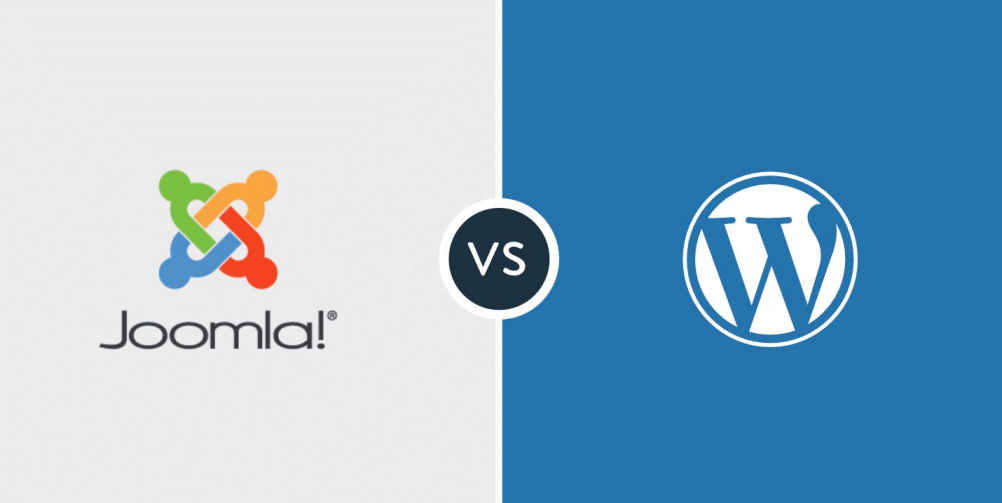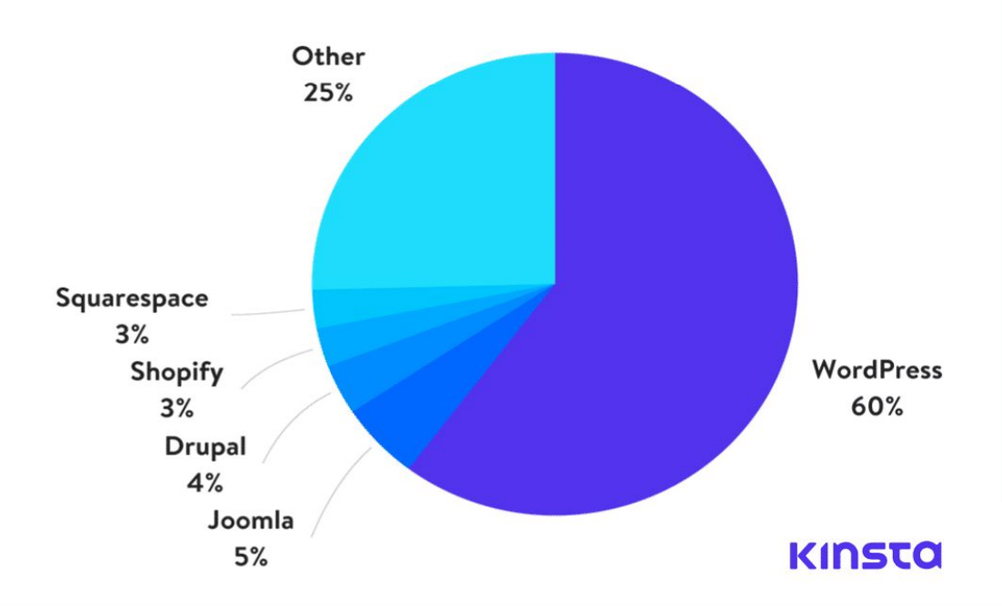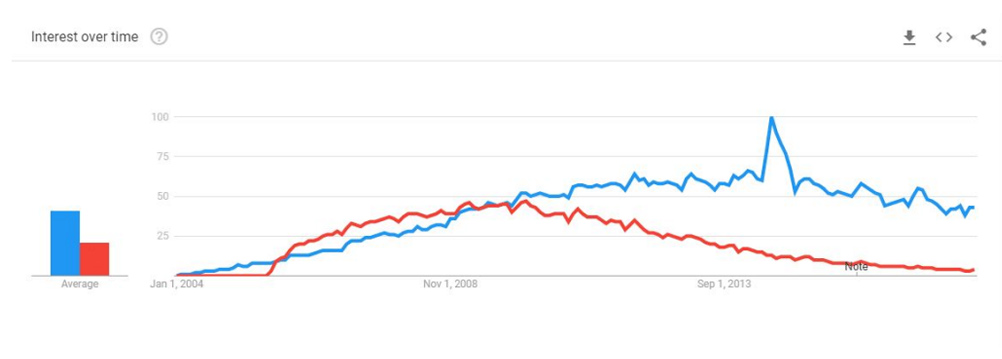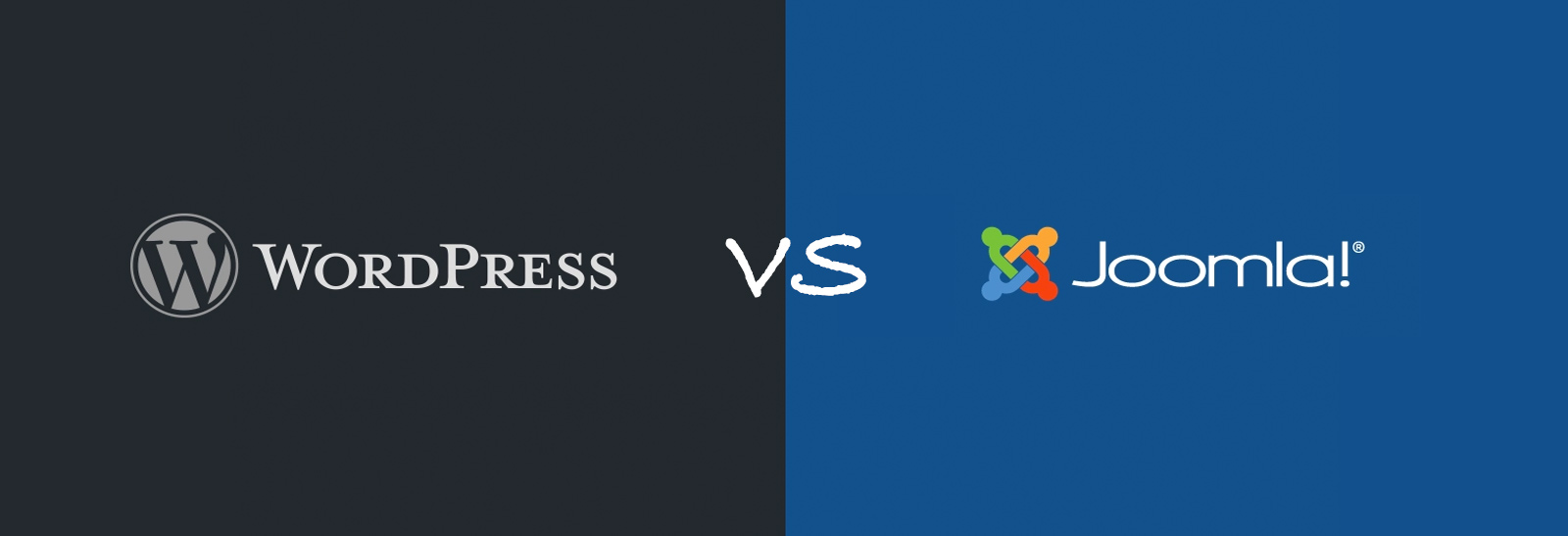
JOOMLA VS WORDPRESS

Trying to decide between Joomla vs WordPress for your next website?
While there are tons of good reasons to use WordPress, we recognize that WordPress isn’t the only content management system to help you build a website. We’ll dig into each content management system and give you a better idea of each platform’s pros and cons.
Joomla vs WordPress: Introduction And What The Numbers Say
Both WordPress and Joomla are self-hosted, open-source content management systems that have been around for well over 10 years.
Originally launched as a blogging platform in 2003, WordPress is now a multi-purpose content management system that powers over 35.2% of all the websites on the Internet (including a lot more than just blogs!). In terms of the market share of the content management system market, WordPress holds an even more dominant 35.2% market share.
Launched in 2005, Joomla is almost just as old as WordPress. Behind WordPress, Joomla is the second most popular content management system, powering around 3% of all the websites on the Internet and holding 5.4% of the content management system market.

While Joomla still retains this second place crown for now, its content management system market share has been shrinking since at least 2010 and its overall share of the website market shrank for the first time ever in 2017.
You can see this trend play out visually if you look at a Google Trends comparison between “WordPress” and “Joomla” from 2004 to present. Joomla was actually leading or equal until 2010 when WordPress began dominating:

All that to say – WordPress is still growing, while Joomla is slowly moving in the opposite direction. That doesn’t mean Joomla has nothing to offer, though!
What Are Some Of The Commonly Touted Advantages Of WordPress And Joomla?
If you search around for Joomla vs WordPress, you can find plenty of ideological battles between developers on both sides of the spectrum. In general, here are some of the broad reasons you’ll see on each side for why one platform is the best:
WordPress Advantages
● Ease of use – WordPress is generally regarded as being the easiest content management system to use, especially for non-developers.
● Better suited for blogging – WordPress includes a distinction for “blog posts” vs “static pages” right out of the box, whereas Joomla just includes a single “article” type that you can manipulate with categories.
● Extensibility – WordPress has, by far, the largest ecosystem of plugins and themes, which makes it easy to extend your site with a variety of different features.
● Huge support community – because WordPress is so popular, it’s easy to find help via the massive third-party ecosystem of blogs, Facebook groups, and developers.
● Lower development costs – this huge community also means you can generally get development work done a bit cheaper.
Joomla Advantages
● More advanced user management – Joomla offers a more advanced system for user access controls and user management out of the box.
● Flexible for different content types – Joomla’s components and modules give you a bit more flexibility for displaying non-standard content types.
● Multilingual support – Joomla has multilingual support built-in to the core, while WordPress requires you to use a third-party plugin.
● Multiple templates – Joomla lets you use different templates for different pieces of content, whereas you can only use one WordPress theme.
● How Easy Is It To Get Up And Running With WordPress And Joomla?
● While Joomla is a more beginner-friendly option than something like Drupal,
WordPress is still the easiest and fastest way to create a website.
WordPress Ease Of Use And Learning Curve
If you’re just creating a “regular” website with static content and/or a blog, it’s possible to get up and running with something that looks good in just a couple of hours.
Most hosts include WordPress auto-installers or even come with pre-installed WordPress.
From there, the WordPress interface is easy enough that most casual users can start creating content right away.
Newer additions like the WordPress Customizer now also make it easy for people to make safe, code-free theme changes, which is especially helpful as more and more WordPress themes are embracing the Customizer in interesting ways.
Joomla Ease Of Use And Learning Curve
Like WordPress, most web hosts sport a Joomla auto-installer that makes it easy to get the Joomla software installed.
From there, you’ll need to put a little more time and effort into your site, though. As we said, Joomla uses a combination of Articles and Categories. So before you start creating content, you need to create categories for the type of content you want to create.
It’s nothing too overwhelming, but it is a bit more of an involved process than WordPress, especially for non-developers.
The Joomla TinyMCE Article editor is almost identical to WordPress’ implementation of the TinyMCE editor, so there’s no huge difference on that front:
But those who aren’t already familiar with the Joomla interface are going to be bogged down by the sheer number of options available in the various admin screens:
With that being said, Joomla does have some user-friendly editing tools, like page builder extensions, that make things a little less developer-oriented.
How Can You Extend Your Website With Joomla And WordPress?
Both Joomla and WordPress offer multiple add-on types that you can use to extend your site:
Functionality – WordPress calls these plugins, while Joomla calls them extensions Aesthetics – WordPress calls these themes, while Joomla calls them templates WordPress’ extension marketplace is larger in terms of sheer numbers, but both platforms have a good deal of variety.
How Many Plugins And Themes Does WordPress Have?
Currently, WordPress has:
54,000+ free plugins at the official WordPress.org plugin directory, plus thousands of premium plugins 5,000+ free themes at the official WordPress.org plugin directory, plus thousands of premium themes
How Many Extensions And Templates Does Joomla Have?
Currently, Joomla has:
~8,000 extensions listed at the official Joomla extension library There’s no official Joomla template library, so it’s hard to get a number for available Joomla templates. Some basic Google searching turns up a wealth of (mostly) premium Joomla templates, though.
Are WordPress And Joomla Equally Secure?
The core software of both Joomla and WordPress is secure. Additionally, each platform also features third-party plugins or extensions to add additional security, as well as easy in-dashboard update systems to help keep everything up-to-date.
With that being said…human error is always a real thing and, because each platform is extensible, there are bound to be security issues.
According to Sucuri’s data, Joomla sites seem to experience a higher number of hacked sites in comparison to their market share. But again, there’s nothing inherent in each that makes one platform more or less secure in the majority of situations




Sorry, the comment form is closed at this time.